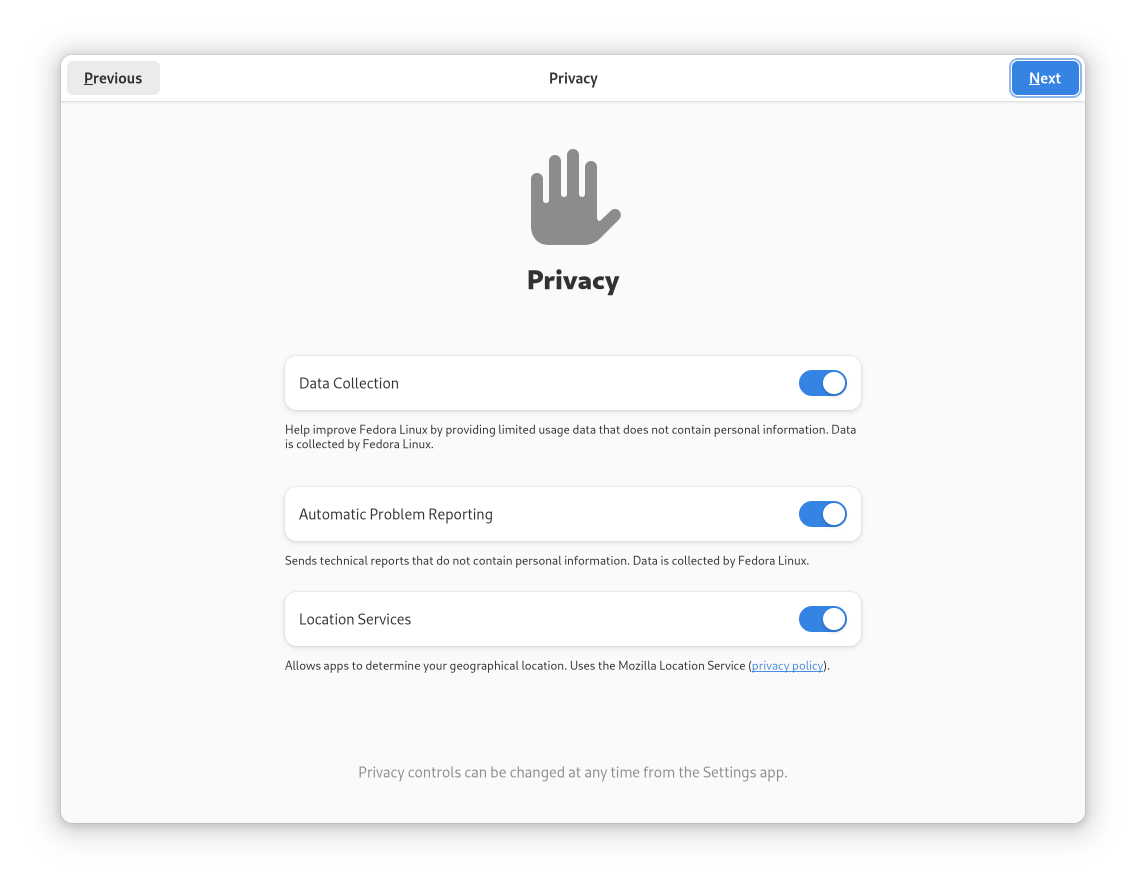A proposal by a Red Hat engineer is causing controversy in the Fedora community, which is related to the addition of opt-out telemetry to the Fedora desktop workstation edition.
The proposal describes a privacy-preserving data collection mechanism that could help the developers know more about their users and how they interact with Fedora, including various GNOME applications, without revealing any personal data whatsoever. They say this data is essential to figure out what are the most common software and user setups among their users, and that it could be beneficial for many various teams in the Fedora community.
With this data, they can enhance the default experience or make it more accessible to apply the changes and additions their users are doing after installation by themselves.
The following part describes how the data-collection mechanism will work:
A new metrics collection setting will be added to the privacy page in gnome-initial-setup and also to the privacy page in gnome-control-center. This setting will be a toggle that will enable or disable metrics collection for the entire system. We want to ensure that metrics are never submitted to Fedora without the user’s knowledge and consent, so the underlying setting will be off by default in order to ensure metrics upload is not unexpectedly turned on when upgrading from an older version of Fedora. However, we also want to ensure that the data we collect is meaningful, so gnome-initial-setup will default to displaying the toggle as enabled, even though the underlying setting will initially be disabled. (The underlying setting will not actually be enabled until the user finishes the privacy page, to ensure users have the opportunity to disable the setting before any data is uploaded.) This is to ensure the system is opt-out, not opt-in. This is essential because we know that opt-in metrics are not very useful. Few users would opt in, and these users would not be representative of Fedora users as a whole. We are not interested in opt-in metrics.
In the initial Fedora setup for new installations, the toggle button for this telemetry will look something like this (provided by the proposal maker):
Users upgrading from previous Fedora releases to new ones will need to explicitly opt-in in order to participate in telemetry because there is no way to show them this toggle button otherwise. Other than that, it is opt-out by default, and they say the data is only valuable to them if this is the case.
The Red Hat engineer making the proposal also added how the data will take shape on Fedora servers:
So let’s say that on Thursday you use Epiphany, Geary, gfeeds, GNOME Text Editor, and GNOME Console. We might send five separate events indicating that some user launched each application on that day. So the data on the server might look something like: <Epiphany, 5000 users on July 6>, <Firefox: 500,000 users on July 6>.
Users’ IP addresses will not be stored or linked with other data, and no personally-identifiable information will ever be collected, he assured.
Various reactions were spotted in the community, both on social media sites and also on the proposal discussion page itself.
“There must be an internal contest at Red Hat to see which group can generate the most negative press and/or piss off the most people”.
“If Ubuntu announced something similar, we would not hear the end of it”.
“Doesn’t sound evil, there is a limited amount of stuff that can be done without users’ input”.
And so on…
However, Fedora Project leader Matthew Miller correctly noted that Ubuntu is pretty much doing the same. During the installation phase of any Ubuntu setup, a dialog asks users whether they want to enable or disable telemetry in their new systems:
And according to Canonical, 66% of users happily choose to send the data, helping make Ubuntu better.
While of course this is influenced by the fact that it is turned on by default, and in the world where users click “next next” during the installation of any new software, it is still an impressive result.
From our perspective, we agree with the proposal and see it as a GO for a few reasons:
This is already being done by Ubuntu, the most famous Linux desktop distribution.
The data collected is anonymized and not personally-identifiable.
There is clear and transparent communication about the change BEFORE implementing it, and not like some shady developers secretly try to add it like Audacity.
The data could be hugely beneficial for various teams in the community, which could make the default UX much better in the future.
There is a big button to enable or disable the option during the initial setup phase. It’s hard to miss, and any user not wishing to send telemetry can simply toggle it off. This is could be hardly considered “shady data-collection” or “dark patterns” when you see it in your face during installation.
If you independently look at the matter from both sides, and see the huge possible benefit to the community from implementing this step, and compare it to the small annoyance of the additional toggle button during the setup phase… Then you would arrive to the conclusion that this is indeed a good suggestion in and of itself, and not just because Red Hat is trying to enforce it on Fedora or whatsoever.
However, this couldn’t have come at a worse time; the community is still mad at Red Hat for locking the source code of their RHEL packages behind a paywall, and some developers are even dropping RH support from their software and even switching away from Fedora fearing it could face a bad future… And now you get this proposal out of a sudden. Perhaps had it been a normal user who made the proposal, then the tone of controversy could have eased a lot.
Reminder to our followers and readers… No need to pick up pitchforks yet at every discussion. Think rationally about what is at hand, and how things look to the other side of the stake, and then say what you think.





